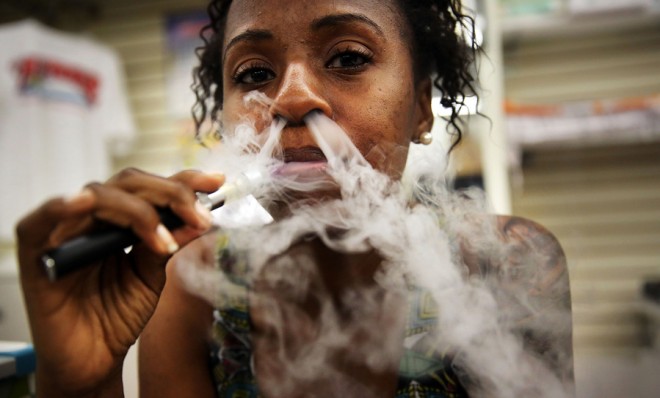Do e-cigarettes cause cancer?
Put this new research in your pipe and vape it

A free daily email with the biggest news stories of the day – and the best features from TheWeek.com
You are now subscribed
Your newsletter sign-up was successful
More steam for the anti-vaping movement: A French consumer magazine, National Consumer Institute, reported Monday that e-cigarettes contain "a significant quantity of carcinogenic molecules" in their vapor that have so far gone undetected.
E-cigarettes, those battery-powered devices you see people puffing indoors, use heat to vaporize liquid nicotine, but contain no tobacco and produce no smoke, and thus evade anti-smoking regulation.
Using a new method of testing, researchers found that in three out of the ten e-cigs studied, the level of formaldehyde, a known carcinogen, came close to the amount in conventional cigarettes. Furthermore, a highly toxic molecule called acrolein was detected "sometimes at levels even higher than in traditional cigarettes," said Thomas Laurenceau, chief editor of the magazine.
The Week
Escape your echo chamber. Get the facts behind the news, plus analysis from multiple perspectives.

Sign up for The Week's Free Newsletters
From our morning news briefing to a weekly Good News Newsletter, get the best of The Week delivered directly to your inbox.
From our morning news briefing to a weekly Good News Newsletter, get the best of The Week delivered directly to your inbox.
"This is not a reason to ban them, but to place them under better control," he said.
Laurencea's sentiment has been echoed by vaping skeptics across the pond, where the U.S. Food and Drug Administration is chewing on a set of possible regulations due out this fall, including a ban of online sales to prevent sales to minors and limits on advertising. Meanwhile, Michael Bloomberg, New York City's health-conscious mayor, is considering a plan that, among other things, would outlaw e-cig flavors like bubble gum that seem designed to attract youngsters.
The problem, say e-cig's detractors, is that without more long-term studies and tests, we don't know if they're the safe alternative to regular cigarettes that their proponents claim they are.
"The small studies that have been done so far hint at both pros and cons; one found that smokers cut back on real cigarettes after trying the electronic kind, while another found particles of metal and and silicates in e-cigarette vapor that could cause breathing problems," says the Bangkok Post. "It would be great if e-cigarettes turned out to be the breakthrough that gets people to give up smoking tobacco. In the meantime, we should all be careful that e-cigarettes not perpetuate a habit that society has come a long way toward snuffing out."
A free daily email with the biggest news stories of the day – and the best features from TheWeek.com
On the other end, vaping advocates are offended by the rush to condemn a breakthrough that could save hundreds of thousands of lives a year. "The anti-smoking movement is a victim of its own success," says Nick Gillespie at The Daily Beast. "This time, the buttinskys are trying to douse the dreaded e-cigarette, a device that supplies a safe nicotine hit to the user without bothering or endangering anybody else."
"[T]he prohibitionists are taking on e-cigarettes because... because... because... smoking tobacco is bad for you. And they don't think you should decide how to live your life," he says.
The idea is that e-cigs can't be as bad as regular cigarettes. And if regulators get too rule-happy, they might prevent real smokers from becoming faux smokers.
"Allowing anti-smoking ideology to dictate e-cig legislation would condemn smokers to using ineffective quitting strategies or dying premature, tar-sodden deaths, but evidence-based regulation that prioritizes public health would cause a revolution in tobacco harm reduction," says Lindsay Fox, an e-cigarette advocate, at The New York Times.
While the debate rages on, the e-cigarette industry is gaining momentum. The market is expected to reach $1 billion this year, and analysts say sales could top $10 billion in the next five years. Without regulation, the e-cigarette business could outgrow the cigarette business by 2047.
Carmel Lobello is the business editor at TheWeek.com. Previously, she was an editor at DeathandTaxesMag.com.
-
 Corruption: The spy sheikh and the president
Corruption: The spy sheikh and the presidentFeature Trump is at the center of another scandal
-
 Putin’s shadow war
Putin’s shadow warFeature The Kremlin is waging a campaign of sabotage and subversion against Ukraine’s allies in the West
-
 Media: Why did Bezos gut ‘The Washington Post’?
Media: Why did Bezos gut ‘The Washington Post’?Feature Possibilities include to curry favor with Trump or to try to end financial losses